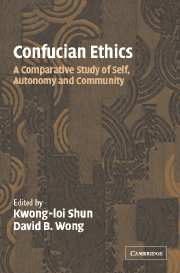Book contents
- Frontmatter
- Contents
- Contributors
- Contributors
- Introduction
- SECTION I RIGHTS AND COMMUNITY
- 1 Are Individual Rights Necessary? A Confucian Perspective
- 2 Rights and Community in Confucianism
- 3 Whose Democracy? Which Rights? A Confucian Critique of Modern Western Liberalism
- 4 The Normative Impact of Comparative Ethics: Human Rights
- SECTION II SELF AND SELF-CULTIVATION
- SECTION III COMMENTS
- Glossary of Chinese Terms
- Index
3 - Whose Democracy? Which Rights? A Confucian Critique of Modern Western Liberalism
Published online by Cambridge University Press: 08 December 2009
- Frontmatter
- Contents
- Contributors
- Contributors
- Introduction
- SECTION I RIGHTS AND COMMUNITY
- 1 Are Individual Rights Necessary? A Confucian Perspective
- 2 Rights and Community in Confucianism
- 3 Whose Democracy? Which Rights? A Confucian Critique of Modern Western Liberalism
- 4 The Normative Impact of Comparative Ethics: Human Rights
- SECTION II SELF AND SELF-CULTIVATION
- SECTION III COMMENTS
- Glossary of Chinese Terms
- Index
Summary
INTRODUCTION
One of the major reasons for engaging in comparative philosophical research is to make a small contribution to the intercultural dialogues that are becoming a more prominent part of international affairs, especially those dialogues that take up basic human issues such as democracy, human rights, and global justice – with the ultimate goal of these dialogues being to increase the probability that the over six billion human citizens of the global community will live more peaceably with one another in the twenty-first century than they did in the twentieth.
If this ultimate goal is to be realized, it is essential that the dialogues be genuine dialogues, with give and take, and with all sides being willing to entertain seriously the possibility that their own moral and political theories might not capture the essence of what it is to be a human being. The necessity of the dialogues being genuine is of especial importance to citizens of the United States, for it is clearly the most powerful voice in virtually every international gathering; the World Court would be a far more effective institution if the United States would agree to abide by its decisions, our oceans would be much more ecologically sound if it would sign the Law of the Sea, and the world would be safer if it would agree to the Comprehensive Test Ban Treaty it urges other nations to ratify. But if the United States is to become more internationally responsible, its regnant ideology must be challenged.
- Type
- Chapter
- Information
- Confucian EthicsA Comparative Study of Self, Autonomy, and Community, pp. 49 - 71Publisher: Cambridge University PressPrint publication year: 2004
- 19
- Cited by



